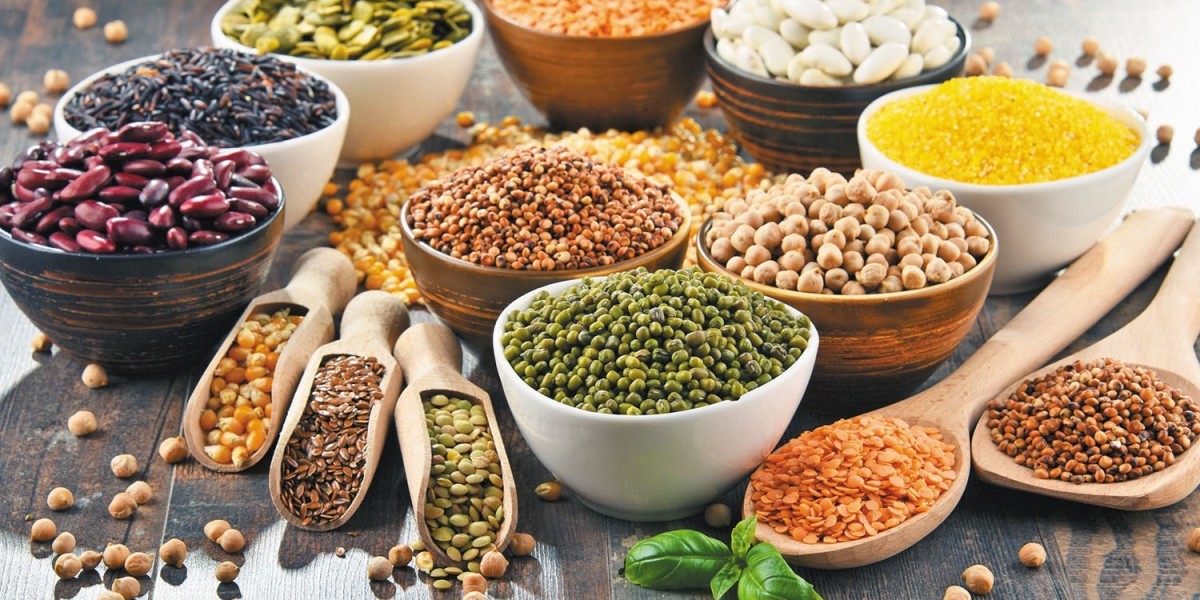According to a new market research report titled “Plant-based Protein Market by Type (Soy Protein, Wheat Protein, Pea Protein, Potato Protein, Rice Protein, Corn Protein), Crop Type (GMO), Source Process (Organic), Application (Food and Beverages, Animal Feed, Nutritional Supplements) - Global Forecast to 2028”, published by Meticulous Research®, the plant-based protein market is expected to grow at a CAGR of 9.7% from 2021 to 2028 to reach $23.4 billion by 2028.
Download Free Sample Report Now @ https://www.meticulousresearch.com/download-sample-report/cp_id=5031?utm_source=blog&utm_medium=social&utm_campaign=product&utm_content=17-08-2023
Consumer interest in boosting protein intake increases with more attention paid to the specific types of protein consumed. With increasing population and welfare, the demand for protein as a food-nutritional component is rising sharply. The high protein trend is gaining traction and will continue to evoke interest in the upcoming years. Consumers have become more aware of protein benefits in supporting an active lifestyle. The desire for clean labels, ease of digestion, the need or desire to avoid allergens, compatibility with vegetarian and vegan lifestyles, and concerns about sustainability among the general population are putting the spotlight on plant proteins. Consumer notions of what constitutes a good protein source are expanding to include a wider variety of plant protein ingredients. Subsequently, interest in plant protein ingredients among food manufacturers and food service operators intensifies, fueling the global plant-based protein market's growth.
The overall plant-based protein market study is segmented based on type, crop type, source process, application, and geography. The study also evaluates industry competitors and analyses the market at a country level.
Increasing demand for plant-based food during the COVID-19 pandemic to drive market growth.
COVID-19 provided a substantial increase in sales of plant-based products, which proved beneficial for all stakeholders in the plant-based proteins market. Few to be listed are:
- As of May 2020, Green Monday’s (China) online sales have doubled, citing the impact of the coronavirus. Among the most popular purchases was a pork substitute called Omnipork.
- In April 2020, JUST, a U.S.-based company that makes egg products from mung beans, announced that its sales on Chinese e-commerce platforms JD.com and Tmall of JUST Egg had surged 30% since the outbreak.
- As of May 2020, U.S.-based California Farms grocery sales increased by 50% compared to 2019. An upsurge in sales was mainly attributed to increased oat milk sales and nutritional plant-based butter.
- In April 2020, in the U.S., retail sales of fresh plant-based meats grew 279.8%. Also, oat milk sales grew 476.7% in the week ending March 2020, while dairy milk sales grew 32.4%. Additionally, according to IRI data, retail sales of meat grew 77% in the week of March 2020.
Speak to our Analysts to Understand the Impact of COVID-19 on Your Business: https://www.meticulousresearch.com/speak-to-analyst/cp_id=5031?utm_source=blog&utm_medium=social&utm_campaign=product&utm_content=17-08-2023
Key findings in the plant-based protein market study
Based on type, the plant-based protein market is segmented into soy protein, wheat protein, pea protein, canola protein, potato protein, rice protein, corn protein, and other plant-based proteins. In 2021, the soy protein segment is estimated to account for the largest share of the overall plant-based protein market. The leading position of this segment is mainly attributed to higher consumer acceptance level, presence of a large number of manufactures and their high scale of production, low cost than other types of plant proteins, easy availability of raw materials, and a large number of applications in various industries. However, the pea protein segment is expected to grow at the highest CAGR during the forecast period. The rapid growth of this segment is mainly attributed to its nutritional qualities and its allergen-free, gluten-free, and lactose-free properties.
Based on crop type, the plant-based protein market is segmented into genetically and non-genetically modified organism crops. The genetically modified organism crops segment is estimated to account for the largest share of the overall plant-based protein market in 2021. The leading position of this segment is mainly attributed to the common use of GMO crops, such as soybean and corn, for plant-based protein production due to their huge productivity and cost-effectiveness. However, non-genetically modified organism crops are expected to grow at the highest CAGR during the forecast period. The rapid growth of this segment is mainly attributed to the recent trend of preference for food products with non-GMO labels, rising demand for eco-friendly, natural, and organic food products, and stringent regulations for GM crops in Europe and Asia-Pacific.
Based on source process, the plant-based protein market is segmented into organic and conventional plant-based protein ingredients. In 2021, the conventional plant-based protein ingredients segment is estimated to account for the largest share of the overall plant-based protein market. The leading position of this segment is mainly attributed to the high availability of crops grown through the traditional harvesting method (with the use of chemical fertilizers), easy accessibility to cost-effective conventional plant-based protein ingredients, their longer shelf life, and availability of substantial crop varieties. However, the organic plant-based protein ingredients segment is expected to grow at the highest CAGR during the forecast period. The rapid growth of this segment is mainly attributed to the increasing demand for preservative and additive-free products.
Based on form, the plant-based protein market is segmented into solid and liquid. The solid segment is estimated to account for the largest share of the overall plant-based protein market in 2021. The large share of this segment is mainly attributed to the growing demand for power plant-based protein coupled with their rising preference considering ease of handling and transport, comparatively lower costs, low chance of formulation mistakes, and their capacity to maintain ingredient stability.
Quick Buy – Plant-based Protein Market Research Report: https://www.meticulousresearch.com/Checkout/94982561?utm_source=blog&utm_medium=social&utm_campaign=product&utm_content=17-08-2023
Based on application, the plant-based protein market is segmented into food and beverages, animal feed, nutrition & health supplements, pharmaceuticals, and others. In 2021, the food and beverages segment is estimated to account for the largest share of the overall plant-based protein market. The large share of this segment is mainly attributed to high consumer demand for sustainable products, growing awareness about the health benefits of plant proteins, increasing health concerns over animal products and ingredients, increasing vegan population, and rising meat prices and clean label trends. However, the nutrition and health supplement segment is also expected to grow at the highest CAGR during the forecast period. The rapid growth of this segment is mainly attributed to changing lifestyles, growing health & wellness trends, and the increasing prevalence of diseases.
Geographically, North America is projected to account for the largest share of the global plant-based protein market in 2021. North America’s prominent position in the plant-based protein market is primarily attributed to the well-established food and beverage industry, rising concerns over animal products and protein, increasing vegan population, growing preference for meat alternatives, increasing demand for healthy & nutritional products, and growing health & wellness trend. However, the Asia-Pacific region is expected to grow at the highest CAGR during the forecast period. The rapid growth of this region is mainly attributed to growing protein-rich diet awareness, increasing health consciousness, growing technological advancements in the food & beverages industry, and increasing raw material availability.
The key players operating in the global plant-based protein market are Archer Daniels Midland Company (U.S.), Cargill, Incorporated (U.S.), Roquette Frères Le Romain (France), Ingredion Incorporated (U.S.), Kerry Group (Ireland), DuPont de Nemours, Inc. (U.S.), Now Foods (U.S.), Tate & Lyle PCL (U.K.), Axiom Foods Inc. (U.S.), AMCO Protein (U.S.), Burcon NutraScience Corporation (Canada), BENEO GmbH (Germany), Glico Nutrition Co., Ltd (Japan), Glanbia plc (Ireland), Cosucra Groupe Warcoing SA (Belgium), Sotexpro (France), Farbest Brands (U.S.), Crespel & Deiters GmbH & Co. KG (Germany), Wilmar International (Singapore), and CHS Inc. (U.S.) among others.
TOP 10 COMPANIES IN PLANT BASED PROTEIN MARKET
Scope of the report
Plant-based Protein Market, by Type
- Soy Protein
- Soy Protein Concentrates
- Soy Protein Isolates
- Textured Soy Protein
- Soy Flour, Grits, and Chunks
- Wheat Protein
- Vital Wheat Gluten
- Wheat Protein Isolates
- Hydrolysed Wheat Protein
- Textured Wheat Protein
- Pea Protein
- Pea Protein Isolate
- Pea Protein Concentrate
- Others
- Canola Protein
- Potato Protein
- Rice Protein
- Corn Protein
- Others
Plant-based Protein Market, by Crop Type
- Genetically Modified Organism Crops
- Non- genetically Modified Organism Crops
Plant-based Protein Market, by Source Process
- Conventional Plant-Based Protein Ingredients
- Organic Plant-Based Protein Ingredients
Plant-based Protein Market, by Form
- Solid (Dry)
- Liquid
To gain more insights into the market with a detailed table of content and figures, click here: https://www.meticulousresearch.com/product/plant-based-protein-market-5031?utm_source=blog&utm_medium=social&utm_campaign=product&utm_content=17-08-2023
Plant-based Protein Market, by Application
- Food and Beverages
- Meat, Poultry, & Seafood
- Bakery
- Meat Analogue
- Dairy & Dairy Alternatives
- Cereals & Snacks
- Beverages
- Others
- Animal Feed
- Nutrition & Health Supplements
- Pharmaceuticals
- Others
Plant-based Protein Market, by Geography
- North America
- U.S.
- Canada
- Europe
- Germany
- France
- U.K.
- Italy
- Spain
- Rest of Europe (RoE)
- Asia-Pacific (APAC)
- China
- Japan
- India
- Australia
- Rest of Asia-Pacific (RoAPAC)
- Rest of World
- Latin America
- Middle East and Africa
Download Free Sample Report Now @ https://www.meticulousresearch.com/download-sample-report/cp_id=5031?utm_source=blog&utm_medium=social&utm_campaign=product&utm_content=17-08-2023



